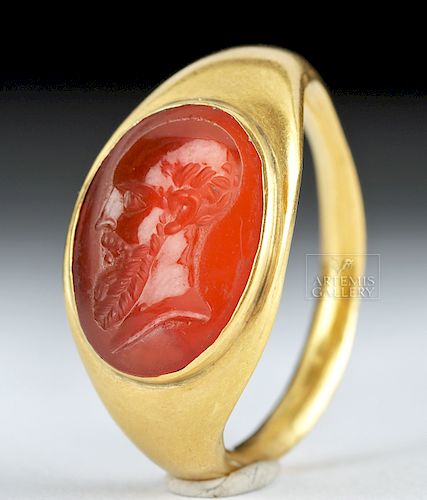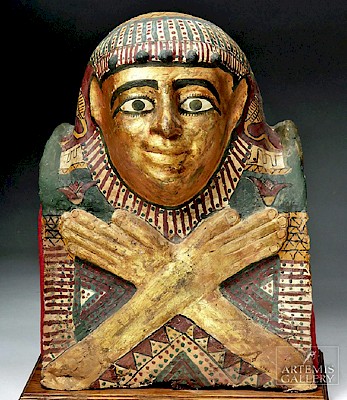22K Gold Ring w/ Roman Carnelian Intaglio ex-Christie's
Lot 56a
About Seller
Artemis Fine Arts
686 S Taylor Ave, Ste 106
Louisville, CO 80027
United States
Selling antiquities, ancient and ethnographic art online since 1993, Artemis Gallery specializes in Classical Antiquities (Egyptian, Greek, Roman, Near Eastern), Asian, Pre-Columbian, African / Tribal / Oceanographic art. Our extensive inventory includes pottery, stone, metal, wood, glass and textil...Read more
Categories
Estimate:
$2,500 - $3,500
Absentee vs Live bid
Two ways to bid:
- Leave a max absentee bid and the platform will bid on your behalf up to your maximum bid during the live auction.
- Bid live during the auction and your bids will be submitted real-time to the auctioneer.
Bid Increments
| Price | Bid Increment |
|---|---|
| $0 | $25 |
| $300 | $50 |
| $1,000 | $100 |
| $2,000 | $250 |
| $5,000 | $500 |
| $10,000 | $1,000 |
| $20,000 | $2,500 |
| $50,000 | $5,000 |
| $100,000 | $10,000 |
| $200,000 | $20,000 |
About Auction
By Artemis Fine Arts
Jun 20, 2018
Set Reminder
2018-06-20 10:00:00
2018-06-20 10:00:00
America/New_York
Bidsquare
Bidsquare : DAY 1 | Antiquities, Asian, Russian, Fine Art
https://www.bidsquare.com/auctions/artemis-gallery/day-1-antiquities-asian-russian-fine-art-3276
Day 1 of an important 2-day auction featuring exceptional art from around the world Artemis Fine Arts info@artemisfinearts.com
Day 1 of an important 2-day auction featuring exceptional art from around the world Artemis Fine Arts info@artemisfinearts.com
- Lot Description
Roman, Republican to Imperial Period, ca. 1st century BCE. A special ring featuring a large oval carnelian intaglio, finely incised with the likeness of a philosopher, his portrait head in profile facing left, presenting a bald pate, short hair above the ear and behind the head, with one wide open eye beneath an arching brow, a prominent nose, and generous beard and mustache framing his mouth. Mounted as a ring in a modern 22K gold setting. Weight: 14.8 grams Size: intaglio measures ~ .75" L x .625" W (1.9 cm x 1.6 cm) US ring size 7.
Interestingly, the ancient Romans were more interested in pursuits of engineering and the law than science and philosophy - in this way departing from the Greeks. However, the Romans were responsible for disseminating Greek culture and ideas. After all, they honored many of the same gods, only renaming them and claiming them as their own. As far as philosophy was concerned, Marcus Tullius Cicero (106-43 BCE) adopted the Greek philosophy of Stoicism which aimed to identify universal morals and standards based upon reason and nature. Marcus Aurelius and Epicetus would popularize it further.
Provenance: private East Coast, USA collection; ex-Christie's, New York (Ancient Jewelry, Sale 2771, December 13, 2013, Lot 286); ex-Vasken Demirjian, New York, USA, ca. 1990; ex-Christie's, New York (Ancient Jewelry, December 9, 2004, lot 139)
All items legal to buy/sell under U.S. Statute covering cultural patrimony Code 2600, CHAPTER 14, and are guaranteed to be as described or your money back.
A Certificate of Authenticity will accompany all winning bids.
We ship worldwide and handle all shipping in-house for your convenience.
#135016Ancient carnelian intaglio is in excellent condition. Slight wear to the modern 22K gold setting.Condition
- Shipping Info
-
All shipping is handled in-house for your convenience. Your invoice from Artemis Gallery will include shipping calculation instructions. If in doubt, please inquire BEFORE bidding for estimated shipping costs for individual items.
-
- Buyer's Premium



 EUR
EUR CAD
CAD AUD
AUD GBP
GBP MXN
MXN HKD
HKD CNY
CNY MYR
MYR SEK
SEK SGD
SGD CHF
CHF THB
THB













